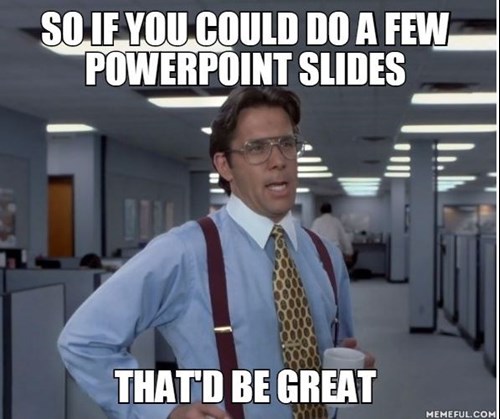Believe it or not PowerPoint turns 30 this year.
If you have just sat through a particularly dull presentation it may well feel like it has been around much, much longer.
But whatever your thoughts about it – and yes we’ve all heard the ‘death by PowerPoint’ line – there is no doubting the impact it has had on public speaking.
PowerPoint came into existence in 1987 after trademark issues brought an end to its predecessor called Presenter. Now it is widely reported that 30 million PowerPoint presentations are created every day and that there are 500 million users worldwide.
Even though other systems are available the name ‘PowerPoint’ has become synonymous with any presentation which features slides.
So it doesn’t look like it is going to go away any time soon even if the last presentation you sat though left you bored and frustrated.
So how can public speakers use it better?
1. Do you actually need slides?
Something we stress on our presentation coaching courses is that not every presentation needs slides. So before you plough headlong into PowerPoint think about what the audience would gain from them.
There are some clear advantages to having slides but it is worth considering that if you present without them the audience’s focus will be completely on you.
And, because most people present with slides, not using them may make your presentation standout.
If you are still unsure, take a look at some of the most popular TED talks and you will notice many of them are delivered by presenters who don’t use slides.
2. Don’t start with slides
What is the first thing you do when you start to prepare a presentation? For many people the answer is that they begin by working on their slides rather than what they actually want to say.
Before you open PowerPoint think about who your audience, what you want to get across, and what you want them to take away (be realistic - they are not going to remember everything you say no matter how good your presentation is).
Only think about your slides once you have finished your script.

3. Less is more
It’s important to remember people don’t come to a presentation to read and slides containing huge paragraphs of text will only serve to turn the audience off and distract them from what you are saying.
Instead of text heavy slides, opt for ones which show the odd headline statistic or tag line which will support and underline your message.
Good animations, photography and cartoons will also add colour.
4. Don’t read
We have probably at some point all witnessed a presenter simply read from their dreary text heavy slides.
It is something which tends to happen when people present content or a subject they are not confident about. And reading them simply reinforces that perception.
It can also be seen as lazy, is certainly not engaging and it may be better for all concerned if you just handed out printed copies of the slides or sent an email.
Avoiding putting lots of text on slides removes the temptation to simply read them.
Careful planning preparation and strong storytelling skills will ensure you can deliver a presentation without resorting to reading.
5. Think about images
We’ve all seen them – presentations packed with stock photos. Business people gathered around a computer or meeting table, an arrow hitting the bullseye, people giving a thumbs up. Yawn.
Not only do these images offer nothing to the story but they’ve been used to death.
It is time to be imaginative if you want to make an impact. Aim for pictures which are unique and meaningful and will actually help the audience remember the point you are trying to get across.
6. Stick to the golden rules
There are some simple golden rules of slide making that good presenters stick to:
*No more than four points per slide
*No more than 20 characters per line
*No more than 25 words on a slide
*Create a constant look and feel
Here’s to another 30 years of PowerPoint.
Media First are media and communications training specialists with over 30 years of experience. We have a team of trainers, each with decades of experience working as journalists, presenters, communications coaches and media trainers.
If you like this blog, read more about our highly practical presentation delivery coaching courses.
Subscribe here to be among the first to receive our blogs.


